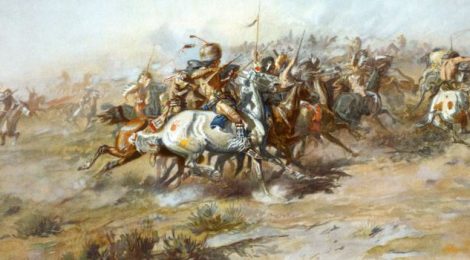
Custer’s Last Stand 144th Anniversary: Why Is This Defeat So Well Remembered?
Custer’s Last Stand 144th Anniversary
Why Is This Defeat So Well Remembered?
June 25, 1876, 144 years ago today, Lt. General George Armstrong Custer met his fate at the Battle of the Little Bighorn. History, and America’s historical memory (such as it is), remembers that battle by another name: Custer’s Last Stand.
Many books, movies, plays, and other remembrances in the media help us recall this man and this battle. Why is Custer’s Last Stand so well-known among America’s military defeats? Unusually, for American military history, this battle (and a battle it was, not a massacre, as some folks like to think of it), is known by a person’s name. Perhaps this is one of the reasons this battle resonates throughout our history, even to this day. While Custer and 265 of his men (and quite a few Sioux and Cheyenne warriors as well), died that day on the banks of the Little Bighorn River, the news of this military disaster reached the eastern cities on the eve of the 100th anniversary of the United States’ birth. The juxtaposition of the nation’s Centennial celebrations with one of the worst military defeats of the Native American wars caused not a little shock to America’s collective consciousness. But again, the mythology and the reality of the situation do not always jive.
Many of the stories surrounding the Little Bighorn battle refer to Custer’s defeat as the worst U.S. Army defeat of the Indian Wars. Yet, while significant in its time, this defeat paled in comparison to the Battle of the Wabash in 1791, in which General St. Clair lost to Native American forces in what is known as Little Turtle’s War. St. Clair lost nearly 1,000 men, yet this battle is little remembered and the anniversary (November 4), is not marked at all in popular culture.
If we look away from the Native American/Indian Wars, American military history is actually full of major defeats, most much bigger than Custer’s defeat. In the War of 1812, the British captured and burned the nation’s capital city. How well is that remembered? In World War Two, big-time defeats include Pearl Harbor, the Fall of the Philippines, Wake Island, and Kasserine Pass. In the Korean War, the Chosin Reservoir Battle is hailed as a miracle of Marine Corps history, but despite the bulk of American forces surviving that retreat, it was really a major victory for the Chinese, not the Americans and allied forces. Of all these major defeats, only Pearl Harbor still has a grip on the American memory.
Custer was a dashing figure who was very well-known in his time, not just for his exploits on the western frontier, but also for his heroism and his victories in the Civil War. Yes, his defeat was a big deal at the time, but within a few months, the reinforced U.S. Army won the Sioux War and forced Sitting Bull, the victor of the Little Bighorn, to go into exile in Canada. American history is full of military defeats, but Custer’s Last Stand is perhaps the most well-known and mythologized of them all.

